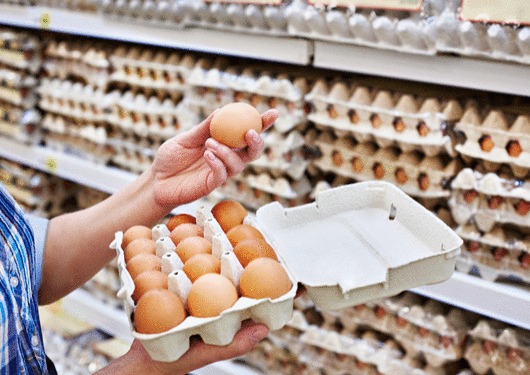
Home » Cheap Eggs Flood U.S. Grocery Stores
Cheap Eggs Flood U.S. Grocery Stores

August 4, 2017
Poultry farms in the U.S. have fully restocked and rebuilt egg supplies since the outbreak but demand hasn't kept up. Some buyers who found alternatives during the outbreak haven't returned. Egg prices are near a decade low, a situation that cheers shoppers in grocery aisles but is spurring losses for industry giants and farmers alike.
“We do not expect to see any meaningful improvement until there is a better balance of supply and demand,” said Dolph Baker, the chief executive of Cal-Maine Foods Inc., the largest U.S. egg supplier by sales. The company blamed the egg glut for its first annual loss in more than a decade, adding that the average price of eggs sold to its customers dropped 42 percent over the past year.
Large shell eggs, the type sold at the grocery store, last month cost 98 cents a dozen at wholesale in the Midwest, a 62-percent drop over the past two years, according to market-research firm Urner Barry. Wholesale prices reported by the firm fell to 10-year lows in 2016 and haven’t averaged over $1 a dozen on a weekly basis all this year. The average price U.S. consumers paid for a dozen eggs in June was $1.33, down 48 percent from two years ago, according to federal data.
“This is historic,” said Brian Moscogiuri, an analyst who tracks the egg market for Urner Barry.
RELATED CONTENT
RELATED VIDEOS
Related Directories
Subscribe to our Daily Newsletter!
Timely, incisive articles delivered directly to your inbox.
Popular Stories

2024 Supply Chain Management Resource Guide: There's Only One Way Off a Burning Platform
VIEW THE LATEST ISSUECase Studies
-
Recycled Tagging Fasteners: Small Changes Make a Big Impact
-

Enhancing High-Value Electronics Shipment Security with Tive's Real-Time Tracking
-

Moving Robots Site-to-Site
-
JLL Finds Perfect Warehouse Location, Leading to $15M Grant for Startup
-
Robots Speed Fulfillment to Help Apparel Company Scale for Growth



